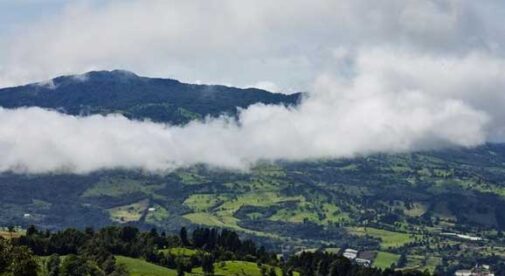Marilyn Stevens, 71, and Paul Hastings, 77, were teaching English as a Second Language nine years ago when Paul realized he didn’t want to work anymore.
But while Paul was already eligible for Social Security, Marilyn would have to work six more years. And they wouldn’t be able to live off his payment alone… At least not in Phoenix.
And that’s how the couple ended up living amidst the hillside coffee plantations outside of the small Costa Rican market town of Grecia, in the mountainous Central Valley region in the heart of the country.
[question_evergreen]
After identifying Costa Rica as a potential new home, the couple took a tour and then rented an apartment for a month to test-drive life in Grecia. They quickly decided it was the place for them.
There was a lot about the country that attracted them: There’s no army, there’s an emphasis on education, and it’s close enough to the U.S. that it’s easy to get back and forth.
Cost of Living and Healthcare
Although costs have gone up in the nearly nine years they’ve lived here, they still find it affordable. Their electric bill in the dry season is $20 a month, up to $40 in the rainy season. Their water bill is $5. They tend to shop at local markets, with trips to specialty stores for imported items now and again.
Healthcare provides the greatest savings. As residents of Costa Rica, they joined the Caja—the government-run medical system, with its network of clinics and hospitals throughout the country. Those in the program pay a monthly fee based on income. After that, there’s no cost for care.
Grecia has a good-sized hospital with an emergency room and plenty of specialists. At one point, Paul broke his fibula and spent a week in the hospital.
“It was wonderful,” says Marilyn, “Except for the food. I had to sneak in chicken legs for him. The people are all very sweet, and the surgeons are terrific.”
And, as Paul notes, it didn’t cost them a penny beyond their monthly payment.
Country Living in the Central Valley
Another factor in choosing Grecia was the climate. Despite Costa Rica being firmly in the tropics, the Central Valley has a temperate climate year-round thanks to the higher elevation, which starts at around 2,000 feet.
“We thought we wanted to live at the beach until we experienced the humidity,” says Paul, who adds that they do enjoy visiting the coasts. Towns like Puerto Viejo on the Caribbean and Dominical and Samara on the Pacific are among their favorite beach spots.
“Here it averages 70 degrees all the time,” explains Marilyn. “We love the climate and how everything is green and flourishing. My plants do really well.”
Their current home is on El Cajon, one of the five ridges outside of town, where most people live. On each ridge are essentially self-contained villages with basic services, shops, schools, and the like. But most people do head into Grecia for shopping, dining out, and medical care.
Although just a 45-minute drive to San José, Costa Rica’s capital, this is a rural area, with coffee plantations blanketing the hillsides and sugar cane fields on the flatter areas. Homes dot the landscape. The Poas volcano, which looks like just another forest-covered mountain, looms above. Everywhere you look it’s lush and green. Look closely and you might spot dairy cows munching on grass on impossibly steep pastures.
“I love the fact that it’s farmland,” says Marilyn.
“I always thought of myself as an urban guy,” notes Paul. “We do miss arts-type events—we were both involved in theater—but this town has enough.”
Friends: Both Four-Legged and Two
The couple pay $925 per month for their rental, which they say is a lot for the area. But they have a big yard, which comes in handy. They have two dogs, five cats, a horse, and a goat.
The horse, Julia, has been with them for many years. The goat, Oliver, is a more recent addition… “To keep Julia company,” explains Marilyn.
Their landlord allowed them to build a horse and goat barn, which they did from scratch with the help of their friends. “Like an Amish barn raising,” laughs Marilyn.

The couple has several close friends in Grecia, with many of them also living on their ridge, which has just one narrow road running up its spine until it ends at a forest. Hiking trails that start there can take you into the national park around Poas.
There are frequent dinners with friends. Often at somebody’s house—they take turns hosting—or in town. The couple like Vesuvio for pizza, Kyoto for sushi, and Vuelta al Mundo for its varied menu featuring dishes from around the world.
“We have a group of nice people here who are simpatico as far as lifestyle,” says Paul.
Marilyn also reads and writes a lot. There’s yoga on Monday and Friday and hiking on Tuesday and Thursday.
Paul is a writer too and plays keyboard with fellow expat musicians—the group sometimes performs at local venues around town. And he has a woodshop.
All in all, the couple says it’s been a great move. But they say being in rural Costa Rica means you have to enjoy quiet country living.
Also important to note, says Marilyn, is that “Our Tico neighbors and friends appreciate that we have some rudimentary Spanish, even though many picked up English in school. Allowing the culture to shape you, instead of trying to re-shape the culture, is critical to a successful and fulfilling life here.”
And that’s something Marilyn and Paul have been able to do.
[costa_rica_signup]
Related Articles
Best Places to Live in Costa Rica: Five Top Expat Havens
An Overview of Traditions and Culture in Costa Rica
[post_takeover]
[lytics_best_articles_collection]

